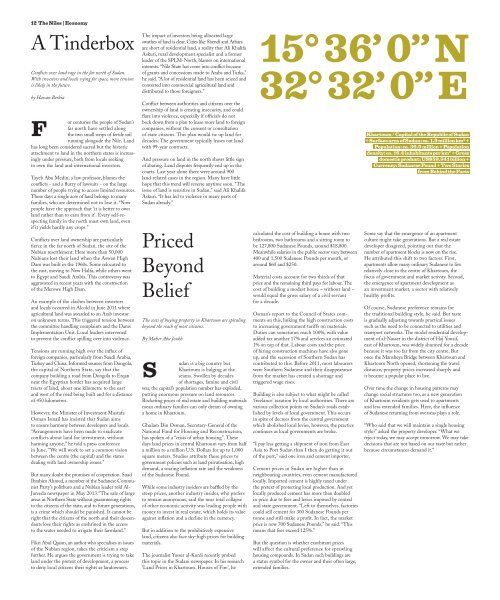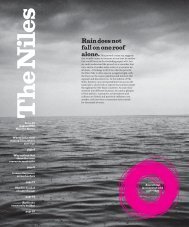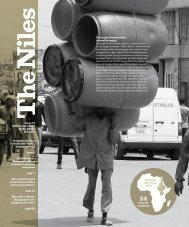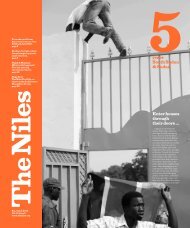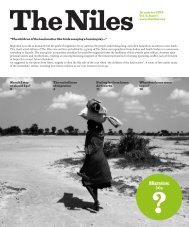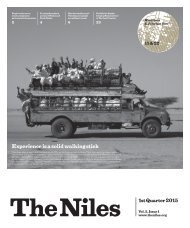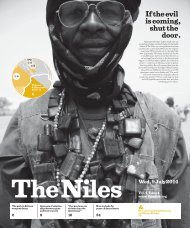Those who have no fence around their land...
...have no enemies. Land has always been more than a matter of square meters for the Sudanese and South Sudanese. The multitude of local languages spoken in the two countries include a vast array of words for land. The precise meaning of the word varies from language to language – but the core remains the same: Land is a cherished asset. This has long been recognised by international investors who lease or buy land in South Sudan and Sudan. Meanwhile the two Sudans argue over minerals and borders. But is the answer fewer fences – as the East African idiom suggests? The Niles journalists, who hail from across both countries, have tackled this highly sensitive topic and have no easy answers. But they have at least sown the seeds of fresh ideas in the third edition of The Niles. Hopefully, they will land on fertile ground.
...have no enemies. Land has always been more than a matter of square meters for the Sudanese and South Sudanese. The multitude of local languages spoken in the two countries include a vast array of words for land. The precise meaning of the word varies from language to language – but the core remains the same: Land is a cherished asset. This has long been recognised by international investors who lease or buy land in South Sudan and Sudan. Meanwhile the two Sudans argue over minerals and borders. But is the answer fewer fences – as the East African idiom suggests? The Niles journalists, who hail from across both countries, have tackled this highly sensitive topic and have no easy answers. But they have at least sown the seeds of fresh ideas in the third edition of The Niles. Hopefully, they will land on fertile ground.
You also want an ePaper? Increase the reach of your titles
YUMPU automatically turns print PDFs into web optimized ePapers that Google loves.
12 The Niles | Eco<strong>no</strong>my<br />
Eco<strong>no</strong>my | The Niles 13<br />
A Tinderbox<br />
Conflicts over <strong>land</strong> rage in the far <strong>no</strong>rth of Sudan.<br />
With investors and locals vying for space, more tension<br />
is likely in the future.<br />
by Hassan Berkia<br />
F<br />
or centuries the people of Sudan's<br />
far <strong>no</strong>rth <strong>have</strong> settled along<br />
the two small strips of fertile soil<br />
running alongside the Nile. Land<br />
has long been considered sacred but the historic<br />
attachment to <strong>land</strong> in the <strong>no</strong>rthern states is increasingly<br />
under pressure, both from locals seeking<br />
to own the <strong>land</strong> and international investors.<br />
Tayeb Abu Medin, a law professor, blames the<br />
conflicts - and a flurry of lawsuits - on the large<br />
number of people trying to access limited resources.<br />
These days a single acre of <strong>land</strong> belongs to many<br />
families, <strong>who</strong> are determined <strong>no</strong>t to lose it. “Now<br />
people <strong>have</strong> the approach that 'it is better to own<br />
<strong>land</strong> rather than to earn from it'. Every self-respecting<br />
family in the <strong>no</strong>rth must own <strong>land</strong>, even<br />
if it yields hardly any crops.”<br />
Conflicts over <strong>land</strong> ownership are particularly<br />
fierce in the far <strong>no</strong>rth of Sudan, the site of the<br />
Nubian resettlement. Here more than 50,000<br />
Nubians lost <strong>their</strong> <strong>land</strong> when the Aswan High<br />
Dam was built in the 1960s. Some relocated to<br />
the east, moving to New Halfa, while others went<br />
to Egypt and Saudi Arabia. This controversy was<br />
aggravated in recent years with the construction<br />
of the Merowe High Dam.<br />
An example of the clashes between investors<br />
and locals occurred in Alcold in June 2011 where<br />
agricultural <strong>land</strong> was awarded to an Arab investor<br />
on unk<strong>no</strong>wn terms. This triggered tension between<br />
the committee handling complaints and the Dams<br />
Implementation Unit. Local leaders intervened<br />
to prevent the conflict spilling over into violence.<br />
Tensions are running high over the influx of<br />
foreign companies, particularly from Saudi Arabia,<br />
Turkey and China. Informed sources from Dongola,<br />
the capital of Northern State, say that the<br />
company building a road from Dongola to Erqan<br />
near the Egyptian border has acquired large<br />
tracts of <strong>land</strong>, about one kilometre to the east<br />
and west of the road being built and for a distance<br />
of 450 kilometres.<br />
However, the Minister of Investment Mustafa<br />
Osman Ismail has insisted that Sudan aims<br />
to ensure harmony between developers and locals.<br />
“Arrangements <strong>have</strong> been made to eradicate<br />
conflicts about <strong>land</strong> for investment, without<br />
harming anyone,” he told a press conference<br />
in June. “We will work to set a common vision<br />
between the centre (the capital) and the states<br />
dealing with <strong>land</strong> ownership issues.”<br />
But many doubt the promises of cooperation. Suad<br />
Ibrahim Ahmed, a member of the Sudanese Communist<br />
Party’s politburo and a Nubian leader told Al-<br />
Jareeda newspaper in May 2013.“The sale of large<br />
areas in Northern State without guaranteeing rights<br />
to the citizens of the state, and to future generations,<br />
is a crime which should be punished. It can<strong>no</strong>t be<br />
right that the citizens of the <strong>no</strong>rth and <strong>their</strong> descendants<br />
lose <strong>their</strong> rights as enshrined in the access<br />
to the water needed to irrigate <strong>their</strong> farm<strong>land</strong>.”<br />
Fikri Abul Qasim, an author <strong>who</strong> specialises in issues<br />
of the Nubian region, takes the criticism a step<br />
further. He argues the government is trying to take<br />
<strong>land</strong> under the pretext of development, a process<br />
to deny local citizens <strong>their</strong> rights as <strong>land</strong>owners.<br />
The impact of investors being allocated large<br />
swathes of <strong>land</strong> is clear. Cities like Shendi and Atbara<br />
are short of residential <strong>land</strong>, a reality that Ali Khalifa<br />
Askuri, rural development specialist and a former<br />
leader of the SPLM-North, blames on international<br />
interests. “Nile State has come into conflict because<br />
of grants and concessions made to Arabs and Turks,”<br />
he said. “A lot of residential <strong>land</strong> has been seized and<br />
converted into commercial agricultural <strong>land</strong> and<br />
distributed to those foreigners.”<br />
Conflict between authorities and citizens over the<br />
ownership of <strong>land</strong> is creating insecurity, and could<br />
flare into violence, especially if officials do <strong>no</strong>t<br />
back down from a plan to lease more <strong>land</strong> to foreign<br />
companies, without the consent or consultation<br />
of state citizens. This plan would tie up <strong>land</strong> for<br />
decades: The government typically leases out <strong>land</strong><br />
with 99-year contracts.<br />
And pressure on <strong>land</strong> in the <strong>no</strong>rth shows little sign<br />
of abating. Land disputes frequently end up in the<br />
courts. Last year alone there were <strong>around</strong> 900<br />
<strong>land</strong>-related cases in the region. Many <strong>have</strong> little<br />
hope that this trend will reverse anytime soon. “The<br />
issue of <strong>land</strong> is sensitive in Sudan,” said Ali Khalifa<br />
Askuri. “It has led to violence in many parts of<br />
Sudan already.”<br />
Priced<br />
Beyond<br />
Belief<br />
The costs of buying property in Khartoum are spiraling<br />
beyond the reach of most citizens.<br />
By Maher Abu Joukh<br />
S<br />
udan is a big country but<br />
Khartoum is bulging at the<br />
seams. Swollen by decades<br />
of shortages, famine and civil<br />
war, the capital’s population number has exploded,<br />
putting e<strong>no</strong>rmous pressure on <strong>land</strong> resources.<br />
Rocketing prices of real estate and building materials<br />
mean ordinary families can only dream of owning<br />
a home in Khartoum.<br />
Ghulam Din Osman, Secretary-General of the<br />
National Fund for Housing and Reconstruction,<br />
has spoken of a “crisis of urban housing”. These<br />
days <strong>land</strong> prices in central Khartoum vary from half<br />
a million to a million U.S. Dollars for up to 1,000<br />
square meters. Studies attribute these prices to<br />
government policies such as <strong>land</strong> privatisation, high<br />
demand, a soaring inflation rate and the weakness<br />
of the Sudanese Pound.<br />
While some industry insiders are baffled by the<br />
steep prices, a<strong>no</strong>ther industry insider, <strong>who</strong> prefers<br />
to remain a<strong>no</strong>nymous, said the near total collapse<br />
of other eco<strong>no</strong>mic activity was leading people with<br />
money to invest in real estate, which holds its value<br />
against inflation and a decline in the currency.<br />
But in addition to the prohibitively expensive<br />
<strong>land</strong>, citizens also face sky-high prices for building<br />
materials.<br />
The journalist Yasser al-Kurdi recently probed<br />
this topic in the Sudani newspaper. In his research<br />
‘Land Prices in Khartoum. Houses of Fire’, he<br />
15° 36’ 0” N<br />
32° 32’ 0” E<br />
calculated the cost of building a house with two<br />
bedrooms, two bathrooms and a sitting room to<br />
be 127,800 Sudanese Pounds, <strong>around</strong> $18,800.<br />
Meanwhile salaries in the public sector vary between<br />
400 and 1,500 Sudanese Pounds per month, or<br />
<strong>around</strong> $60 and $250.<br />
Material costs account for two thirds of that<br />
price and the remaining third pays for labour. The<br />
cost of building a modest house – without <strong>land</strong> –<br />
would equal the gross salary of a civil servant<br />
for a decade.<br />
Osman’s report to the Council of States comments<br />
on this, linking the high construction costs<br />
to increasing government tariffs on materials.<br />
Duties can sometimes reach 100%, with value<br />
added tax a<strong>no</strong>ther 17% and services an estimated<br />
1% on top of that. Labour costs and the price<br />
of hiring construction machines <strong>have</strong> also gone<br />
up, and the secession of Southern Sudan has<br />
contributed to this. Before 2011, most labourers<br />
were Southern Sudanese and <strong>their</strong> disappearance<br />
from the market has created a shortage and<br />
triggered wage rises.<br />
Building is also subject to what might be called<br />
‘freelance’ taxation by local authorities. There are<br />
various collection points on Sudan’s roads established<br />
by levels of local government. This occurs<br />
in spite of decrees from the central government<br />
which abolished local levies, however, the practice<br />
continues as local governments are broke.<br />
“I pay less getting a shipment of iron from East<br />
Asia to Port Sudan than I then do getting it out<br />
of the port,” said one iron and cement importer.<br />
Cement prices in Sudan are higher than in<br />
neighbouring countries, even cement manufactured<br />
locally. Imported cement is highly taxed under<br />
the pretext of protecting local production. And yet<br />
locally produced cement has more than doubled<br />
in price due to fees and levies imposed by central<br />
and state government. “Left to themselves, factories<br />
could sell cement for 300 Sudanese Pounds per<br />
tonne and still make a profit. In fact, the market<br />
price is <strong>no</strong>w 700 Sudanese Pounds,” he said. “This<br />
means that fees exceed 125%.”<br />
But the question is whether exorbitant prices<br />
will affect the cultural preference for sprawling<br />
housing compounds. In Sudan such buildings are<br />
a status symbol for the owner and <strong>their</strong> often large,<br />
extended families.<br />
Khartoum / Capital of the Republic of Sudan<br />
+ Surface area of Sudan: ca. 1.9 million km 2 +<br />
Population: ca. 30.9 million + Population<br />
density: ca. 16.4 inhabitants per km 2 + Gross<br />
domestic product: US$59.941 billion +<br />
Currency: Sudanese Pound + Two Stories<br />
from Behind the Facts<br />
Some say that the emergence of an apartment<br />
culture might take generations. But a real estate<br />
developer disagreed, pointing out that the<br />
number of apartment blocks is <strong>no</strong>w on the rise.<br />
He attributed this shift to two factors: First,<br />
apartments allow many ordinary Sudanese to live<br />
relatively close to the centre of Khartoum, the<br />
focus of government and market activity. Second,<br />
the emergence of apartment development as<br />
an investment market, a sector with relatively<br />
healthy profits.<br />
Of course, Sudanese preference remains for<br />
the traditional building style, he said. But taste<br />
is gradually adjusting towards practical issues<br />
such as the need to be connected to utilities and<br />
transport networks. The model residential development<br />
of al-Nasser in the district of Haj Yousif,<br />
east of Khartoum, was widely shunned for a decade<br />
because it was too far from the city centre. But<br />
once the Mansheya Bridge between Khartoum and<br />
Khartoum North opened, shortening the travel<br />
distance, property prices increased sharply and<br />
it became a popular place to live.<br />
Over time the change in housing patterns may<br />
change social structures too, as a new generation<br />
of Khartoum residents gets used to apartments<br />
and less extended families. Here, the influence<br />
of Sudanese returning from overseas plays a role.<br />
“Who said that we will maintain a single housing<br />
style?” asked the property developer. “What we<br />
reject today, we may accept tomorrow. We may take<br />
decisions that are <strong>no</strong>t based on our taste but rather<br />
because circumstances demand it.”<br />
04° 51’ 0” N<br />
31° 37’ 0” E<br />
Juba / Capital of the Republic of South Sudan +<br />
Surface area of South Sudan: ca. 619,000 km 2<br />
+ Population: ca. 8.26 million + Population<br />
density: ca. 13.3 inhabitants per km 2 + Gross<br />
domestic product: US$13.2 billion +<br />
Currency: South Sudanese Pound + Two<br />
Stories from Behind the Facts<br />
Investors<br />
vs. Farmers<br />
Developers are buying up large chunks of <strong>land</strong> in<br />
South Sudan, leaving locals short of <strong>land</strong> to grow food.<br />
by Esther Muwombi<br />
S<br />
outh Sudan is <strong>no</strong> longer just<br />
a mass of dusty, sleepy towns.<br />
Two years after independence<br />
developers <strong>have</strong> snapped up vital<br />
agricultural <strong>land</strong> <strong>around</strong> towns. Advocates of<br />
this process say the fresh funds will invigorate the<br />
nation’s infrastructure and eco<strong>no</strong>my. Its critics,<br />
however, warn of extreme food shortages as the<br />
crop of new buildings restricts farm<strong>land</strong> for the<br />
expanding population.<br />
The Oak<strong>land</strong> Institute report on <strong>land</strong> in South<br />
Sudan, published in 2011, estimates that 5.15<br />
million hectares of <strong>land</strong> <strong>have</strong> been sought or<br />
secured by private investors in the agribusiness<br />
sector between 2007 and 2010, through intransparent<br />
deals with government officials<br />
and community leaders. The rights of community<br />
<strong>land</strong> owners <strong>have</strong> been ig<strong>no</strong>red, and this<br />
is emerging as a grave source of conflict. The<br />
arrival of hotels, oil companies and banks fills<br />
<strong>land</strong> in the nation’s few urban areas which<br />
would otherwise be used to grow food for the<br />
local population.<br />
The lack of agricultural <strong>land</strong> means mal<strong>no</strong>urishment,<br />
higher food costs and a greater risk<br />
of children dropping out of school (because parents<br />
<strong>no</strong> longer earn from <strong>their</strong> crops and can<strong>no</strong>t pay<br />
school fees). The United Nations warned in March<br />
that more than four million people face food<br />
insecurity in South Sudan, meaning four out<br />
of every ten citizens lack e<strong>no</strong>ugh to eat.<br />
The Oak<strong>land</strong> Institute provides detail on how<br />
locals are ig<strong>no</strong>red in favour of officials earning<br />
a fast buck. In 2008 the United Arab Emiratebased<br />
tourism and conservation investment<br />
company Al Ain Wildlife entered a 30 years<br />
lease agreement with the then Southern Sudanese<br />
Ministry of Wildlife, reportedly under instructions<br />
from the president’s office. The agreement<br />
covered 16,800 square kilometres of this wilderness<br />
of <strong>land</strong> in Boma national park, which Al Ain<br />
agreed to develop and manage for tourism and<br />
conservation.<br />
Revenues from the industry were to be divided<br />
with 70 percent for Al Ain Wildlife and 30 percent<br />
for the then Southern Sudanese government.<br />
About 15,000 people from Anuak, Murle, Jie and<br />
Kachipo were affected by the project and relocated<br />
to a site which was four hours away by car.<br />
Locals were <strong>no</strong>t consulted on this development<br />
plan, <strong>no</strong>r did the project respect its promises<br />
for employment, educational facilities, health<br />
centres, airstrips, boreholes, housing, roads and<br />
a model village.<br />
This example is <strong>no</strong>t a one-off. And, worryingly,<br />
<strong>land</strong> is being sold off fast in a country which<br />
is already reliant on expensive food imports.<br />
Less <strong>land</strong> for agriculture will translate into more<br />
dependency on other nations. A report soon<br />
to be released from the Ministry of Trade, seen<br />
by The Niles, indicates that food imports<br />
especially from East Africa stood at 83 percent<br />
in 2013 so far.<br />
Meanwhile, the fast pace of development<br />
contradicts official and <strong>no</strong>n-governmental organisations’<br />
efforts to improve farming. Muhammad<br />
Nurul Islam, agriculture manager at the Bangladeshi<br />
NGO BRAC told The Niles that fears that<br />
his organisation’s efforts to help local farmers may<br />
stumble due to limited <strong>land</strong> availability. “Although<br />
our projects are going well with the farmers at<br />
the moment, if <strong>no</strong>t e<strong>no</strong>ugh agricultural <strong>land</strong> is<br />
allocated, our projects may fail,” he said, adding<br />
that <strong>no</strong>n-agricultural <strong>land</strong> development could<br />
jeopardise BRAC’s investment of 450,000 euros<br />
in the Central Equatorian town of Yei and the<br />
Western Equatorian capital Yambio to support<br />
24,000 farmers over the next three years.<br />
Meanwhile, the Ministry of Agriculture is<br />
trying to increase loans for farmers – although<br />
securing access to <strong>land</strong> is arguably more important.<br />
Deputy Director for planning, Michaya<br />
Gamunde hopes that farmers can access agricultural<br />
loans. “We are waiting for some funds,<br />
and once available, we shall channel them<br />
through the agricultural bank so that farmers<br />
shall access loans,” Gamunde explained.<br />
But some argue that allotting <strong>land</strong> to investors<br />
is earning the country revenue and infrastructural<br />
development. “After all, the <strong>land</strong> is being leased<br />
and <strong>no</strong>t sold,” a UN worker <strong>who</strong> preferred<br />
a<strong>no</strong>nymity explained. “The same <strong>land</strong> shall<br />
be given back to the government and the locals<br />
shall still benefit from its infrastructure.”<br />
Much of South Sudan’s agricultural <strong>land</strong> is covered<br />
with <strong>land</strong> mines and swamps and the government<br />
lacks funds to clear it. Tom Kidhogwa, a Ugandan<br />
eco<strong>no</strong>mic analyst, said that the <strong>land</strong> should rather<br />
be leased out for development in the meantime,<br />
arguing that it is a more lucrative option than<br />
leaving the <strong>land</strong> empty.<br />
But others advocate a mixture of support for<br />
farmers and investors. Isaac Meta, a student in rural<br />
development at Juba University, aims to run a farm<br />
in his home village Morobo (Central Equatorial<br />
State). “Once I am out of school, I will head back<br />
to Morobo, my fertile village, and make the best<br />
out of it,” he said. “But we <strong>have</strong> to share the <strong>land</strong><br />
with investors because <strong>no</strong>t only agriculture is needed<br />
in South Sudan. Other things are important, too.”<br />
Looking<br />
for Land<br />
Many entrepreneurs struggle to secure a plot in<br />
the new nation. They are urging the government<br />
for a helping hand.<br />
by Joseph Edward<br />
S<br />
<strong>land</strong> to buy.<br />
outh Sudan is roughly twice<br />
the size of Malaysia or Norway<br />
but investors, local and international,<br />
are struggling to find<br />
Roman Ronald is a young South Sudanese<br />
entrepreneur looking for a 500-square-meter<br />
plot to build a new pharmaceutical plant in<br />
Juba. Despite extensive research he has <strong>no</strong>t found<br />
a suitable site, a fact he blames on the lack of<br />
clear laws.<br />
“I did <strong>no</strong>t get any <strong>land</strong> for my business,” Roman<br />
Ronald told The Niles. “There is <strong>no</strong> framework<br />
to regulate Land ownership...the <strong>land</strong> is under<br />
community control.”<br />
Ronald’s reality is <strong>no</strong>t unusual. South Sudan’s<br />
legal system is characterised by a high degree<br />
of ambiguity. Since its creation in 2005, the<br />
legislative assembly has enacted laws covering<br />
a range of issues, but there are still big gaps<br />
in the regulatory framework.<br />
The legal uncertainty scares off flocks of<br />
business people, South Sudan General Business<br />
Union’s acting Secretary General Ochan David<br />
said. “Hundreds of international and local investors<br />
could <strong>no</strong>t establish <strong>their</strong> businesses because<br />
they did <strong>no</strong>t acquire <strong>land</strong>,” he told The Niles.<br />
“It’s difficult to invest in <strong>land</strong> in South Sudan<br />
simply because the <strong>land</strong> is put under community<br />
management.”<br />
He said some investors were scouting for large plots<br />
for agriculture, running to 50 square kilometres.<br />
Most communities were <strong>no</strong>t interested in selling<br />
<strong>their</strong> <strong>land</strong> and did <strong>no</strong>t understand the important<br />
role investors would play in the nation’s development,<br />
David said. He urged officials to act to lure<br />
fresh funds into the country.<br />
South Sudan’s eco<strong>no</strong>my has shrunk dramatically<br />
after its all-important oil income was switched<br />
off for 15 months until April during a spat with<br />
Sudan. David argued that the struggling nation<br />
could benefit to the tune of millions of dollars<br />
in potential revenue if it encouraged investment.<br />
“Land could be a source of income to communities<br />
and government,” he said.<br />
In the face of difficulties accessing <strong>land</strong> in Juba,<br />
he urged investors to scout for <strong>land</strong> in other states.<br />
Last year the Ministry of Commerce in South<br />
Sudan confirmed there are some laws intended<br />
to foster business in South Sudan and protect<br />
investors. However, the laws were <strong>no</strong>t made<br />
available to the public, meaning that investors<br />
and the general public are left in the dark about<br />
<strong>their</strong> rights. “There is the need to simplify the<br />
laws and distribute them widely,” Minister of<br />
Commerce Garang Ding told the World Bank’s<br />
International Finance Corporation.<br />
The few laws that do exist are poorly disseminated<br />
and under-enforced, according to a report<br />
on <strong>land</strong> issues in South Sudan by the Oak<strong>land</strong><br />
Institute. Without rules to guide <strong>their</strong> activities,<br />
government institutions tend to function through<br />
a combination of discretionary decision-making<br />
and preexisting practice. The lack of clarity often<br />
gives rise to power struggles.<br />
Legal ambiguity is among the reasons deterring<br />
international investors from the young country.<br />
Former British Ambassador in South Sudan<br />
Alastair McPhail, <strong>who</strong> worked in the country<br />
until recently, described the obstacles. Addressing<br />
the press in March at the British Embassy in Juba,<br />
he said only a few British companies are currently<br />
trying to start up businesses in Juba. In part, this<br />
was due to negative stereotypes about South Sudan<br />
that continued to deter investment, as international<br />
media focuses on South Sudan’s conflicts.<br />
The lack of legal certainty also deterred investors,<br />
he said, stressing that British investors seek laws<br />
that guarantee justice to investors <strong>who</strong> sign contracts<br />
with the government.<br />
Roman Ronald, meanwhile, is also hoping for<br />
legal progress. As his search for <strong>land</strong> continues,<br />
he fears his plant will remain on the drawing<br />
board until the laws regarding <strong>land</strong> are more<br />
comprehensive and well-k<strong>no</strong>wn. “The government<br />
should intervene to rescue this situation,” he said.


